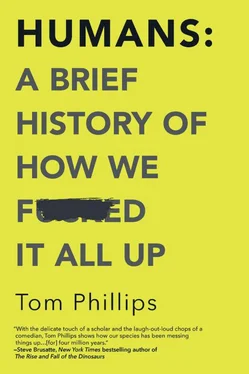Tom Phillips - Humans - A Brief History of How We F*cked It All Up
Здесь есть возможность читать онлайн «Tom Phillips - Humans - A Brief History of How We F*cked It All Up» весь текст электронной книги совершенно бесплатно (целиком полную версию без сокращений). В некоторых случаях можно слушать аудио, скачать через торрент в формате fb2 и присутствует краткое содержание. Город: Toronto, Год выпуска: 2019, ISBN: 2019, Издательство: Hanover Square Press, Жанр: История, Юмористические книги, на английском языке. Описание произведения, (предисловие) а так же отзывы посетителей доступны на портале библиотеки ЛибКат.
- Название:Humans: A Brief History of How We F*cked It All Up
- Автор:
- Издательство:Hanover Square Press
- Жанр:
- Год:2019
- Город:Toronto
- ISBN:978-1-48805-113-5
- Рейтинг книги:4 / 5. Голосов: 1
-
Избранное:Добавить в избранное
- Отзывы:
-
Ваша оценка:
- 80
- 1
- 2
- 3
- 4
- 5
Humans: A Brief History of How We F*cked It All Up: краткое содержание, описание и аннотация
Предлагаем к чтению аннотацию, описание, краткое содержание или предисловие (зависит от того, что написал сам автор книги «Humans: A Brief History of How We F*cked It All Up»). Если вы не нашли необходимую информацию о книге — напишите в комментариях, мы постараемся отыскать её.
Humans: A Brief History of How We F*cked It All Up — читать онлайн бесплатно полную книгу (весь текст) целиком
Ниже представлен текст книги, разбитый по страницам. Система сохранения места последней прочитанной страницы, позволяет с удобством читать онлайн бесплатно книгу «Humans: A Brief History of How We F*cked It All Up», без необходимости каждый раз заново искать на чём Вы остановились. Поставьте закладку, и сможете в любой момент перейти на страницу, на которой закончили чтение.
Интервал:
Закладка:
When the attack actually started, in April 1961, pretty much everything that could go wrong did go wrong. Without the US air force to take out Castro’s air force, the job was left to Cuban exiles flying bombers out of Nicaragua disguised to look like Cuban planes. The plan was to have one plane very publicly land in Miami, and the pilot to announce to the world that he was a defector from the Cuban military who had decided to bomb the air bases himself. This cunning ruse lasted about as long as it took people to notice that the plane wasn’t actually the same type used by the Cubans.
The landing party, which was supposed to arrive secretly under the cover of darkness, was quickly spotted by some local fishermen, who, instead of greeting them as liberators, raised the alarm and then went to shoot at them with rifles. (“We thought, this is the invasion, boys, be careful! They are trying to invade,” one of the fishermen, Gregorio Moreira, recalled to the BBC on the fiftieth anniversary of the invasion.) The invaders quickly discovered that the beach they were supposed to take over the country from was actually quite hard to get off, and only got harder when large parts of the Cuban army (who turned out to be quite efficient, not ramshackle at all) quickly showed up and started shooting at them. Oh, as did a plane from the Cuban air force, which it appeared hadn’t been destroyed by the unconvincing fake bombers, after all.
At this point, the beach force could really have done with some air support, but by now Kennedy was so unnerved by the fact everybody had seen through the “defecting Cuban pilots” trick that he refused to authorize it. So they remained stuck on the beach for several days, fighting an increasingly desperate defense with ammunition running low.
Three days into the abortive invasion, it was clear that they were never getting off the beach without a dramatic intervention, and so finally Kennedy did an about-face and gave authorization for air support. But at this point, the Cuban pilots felt so betrayed by the way the mission had gone that they refused to fly. So the US dumped all pretense of not being involved, and drafted in members of the Alabama National Guard to fly the disguised bombers, which would be supported by a bunch of regular, extremely nondisguised US fighter planes. This might have given the landing party on the beach a fighting chance, except that in the final piece of glorious incompetency, they forgot that there’s a time difference between Nicaragua, where the bombers were, and Miami, where the fighters were, so the two sets of planes didn’t even manage to meet up. Several of them were shot down.
The whole thing ended with the US a global laughingstock, Fidel Castro more firmly entrenched in power than ever and over 1,000 invading troops captured, who a few years later the US would have to pay a ransom of over $50 million to free.
On the plus side, Kennedy learned from the decision-making failures—which might possibly have saved everybody in the world when it allowed cooler heads to prevail during the Cuban Missile Crisis the following year. And thankfully, such was the impact, the United States never again let itself get into a situation where its leaders would allow groupthink to push them into a poorly thought-out invasion based on shoddy intelligence with no clear plan or exit strategy.
Oh.
An estimated 2,000 people died in this 1325 war between Italian city-states Modena and Bologna, which began when some Modenese soldiers stole a bucket from a well in Bologna. Modena won, and promptly stole another bucket.
The shortest war in history, at under three quarters of an hour. A Zanzibari sultan the British didn’t approve of claimed the throne, then barricaded himself in the palace, which the British proceeded to shoot at for a total of 38 minutes before he fled.
In 1969, the long-simmering tensions between El Salvador and Honduras spilled over into actual war—largely sparked by violence during a series of tense World Cup qualifiers between the two countries. (El Salvador won the football; war was a draw.)
A war between Britain and Spain that lasted for over a decade and cost tens of thousands of lives started because in 1731 some Spanish privateers cut off a naval captain’s ear. By the time it was over it had expanded into the War of Austrian Succession, which involved just about every major country in Europe.
Robert Curthose was the eldest son of William the Conqueror who was moved to open rebellion against his father when William didn’t punish his two younger sons sufficiently after they tipped a full chamber pot over Robert’s head.
A war between the British Empire and the Ashanti people of West Africa that started after the British governor threw a strop about the “ordinary chair” he was given and demanded to sit on the Golden Stool—a sacred throne nobody was allowed to sit on. The British won the war, but he never got to sit on the stool.
7
Super Happy Fun Colonialism Party
The human compulsion to explore, to always seek out, new horizons is one of our defining characteristics. It’s why our species and its close cousins spread around the world multiple times in an evolutionary blink of the eye. And it’s the driving force that gave shape to the modern world—which is the dumb, chaotic and frequently wildly unfair product of millennia of migration and trade, colonization and war.
It was that urge to explore that drove Christopher Columbus to set sail into the vast, empty blue waters of the Atlantic in 1492, only to end up crashing onto a load of rocks a few months later like an idiot.
That year was right near the beginning of what is commonly called the “Age of Discovery,” although it was only really discovery if you weren’t one of the people already living in the places being discovered. The overland trade routes between Europe and Asia that had been nice and easy to travel when the Mongol Empire stretched across much of Eurasia (again, more on that in a bit) were now blocked, thanks to a combination of the Black Death and the rise of the Ottoman Empire. And so Europe, buzzing with new technology and knowledge and hungry for riches, set its eyes to the sea instead. And what began as a drive for trade in Asia, Africa and the newly discovered Americas would quickly turn into missions of occupation and conquest.
Pretty much everybody knows that Columbus discovered (well, “discovered”) the Americas by accident, running into the Caribbean by mistake while he was looking for a shortcut to India that didn’t involve going around the southern cape of Africa. But there are also a lot of misconceptions around exactly what his mistake was.
In one common telling, he was essentially proved right, because he had confidence in his heretical theory that the world was round; meanwhile the credulous fools back home believed he was doomed to sail off the edge of the world. This is, I’m sorry to say, utter balls. In fact, pretty much every educated person in Europe at the time (and most of the uneducated ones, too) was fully aware that the world was a globe, and they’d known that for a very long time. It was such common knowledge that over 200 years before Columbus’s journey, the theologian Thomas Aquinas was casually using it in his writing as an example of something that everybody accepted to be true. Given that to this day there’s a persistent minority of people who still doubt the official story put out by Big Globe, the flat-earth theory may well be as popular right now as it was in the fifteenth century. In 2019, a group of flat-earthers are planning to organize a cruise for the flat-earth community, which should be an exciting opportunity for them to test out their theories. Well done, everybody, for that.
Читать дальшеИнтервал:
Закладка:
Похожие книги на «Humans: A Brief History of How We F*cked It All Up»
Представляем Вашему вниманию похожие книги на «Humans: A Brief History of How We F*cked It All Up» списком для выбора. Мы отобрали схожую по названию и смыслу литературу в надежде предоставить читателям больше вариантов отыскать новые, интересные, ещё непрочитанные произведения.
Обсуждение, отзывы о книге «Humans: A Brief History of How We F*cked It All Up» и просто собственные мнения читателей. Оставьте ваши комментарии, напишите, что Вы думаете о произведении, его смысле или главных героях. Укажите что конкретно понравилось, а что нет, и почему Вы так считаете.












